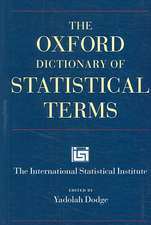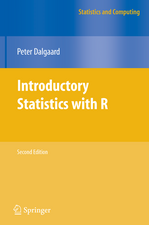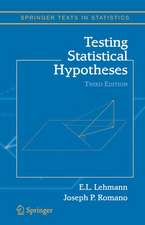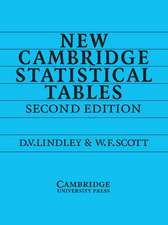Sequential Experimentation in Clinical Trials: Design and Analysis: Springer Series in Statistics, cartea 298
Autor Jay Bartroff, Tze Leung Lai, Mei-Chiung Shihen Limba Engleză Hardback – 11 dec 2012
Sequential Experimentation in Clinical Trials: Design and Analysis covers the much broader subject of sequential experimentation that includes group sequential and adaptive designs of Phase II and III clinical trials, which have attracted much attention in the past three decades. In particular, the broad scope of design and analysis problems in sequential experimentation clearly requires a wide range of statistical methods and models from nonlinear regression analysis, experimental design, dynamic programming, survival analysis, resampling, and likelihood and Bayesian inference. The background material in these building blocks is summarized in Chapter 2 and Chapter 3 and certain sections in Chapter 6 and Chapter 7. Besides group sequential tests and adaptive designs, the book also introduces sequential change-point detection methods in Chapter 5 in connection with pharmacovigilance and public health surveillance. Together with dynamic programming and approximate dynamic programming in Chapter 3, the book therefore covers all basic topics for a graduate course in sequential analysis designs.
| Toate formatele și edițiile | Preț | Express |
|---|---|---|
| Paperback (1) | 689.28 lei 43-57 zile | |
| Springer – 28 ian 2015 | 689.28 lei 43-57 zile | |
| Hardback (1) | 644.63 lei 43-57 zile | |
| Springer – 11 dec 2012 | 644.63 lei 43-57 zile |
Din seria Springer Series in Statistics
- 14%
 Preț: 679.60 lei
Preț: 679.60 lei - 20%
 Preț: 630.97 lei
Preț: 630.97 lei - 20%
 Preț: 816.43 lei
Preț: 816.43 lei - 20%
 Preț: 1000.84 lei
Preț: 1000.84 lei -
 Preț: 390.84 lei
Preț: 390.84 lei - 20%
 Preț: 697.13 lei
Preț: 697.13 lei - 20%
 Preț: 533.34 lei
Preț: 533.34 lei - 20%
 Preț: 884.68 lei
Preț: 884.68 lei - 18%
 Preț: 1237.14 lei
Preț: 1237.14 lei - 18%
 Preț: 961.82 lei
Preț: 961.82 lei - 18%
 Preț: 956.50 lei
Preț: 956.50 lei - 18%
 Preț: 794.25 lei
Preț: 794.25 lei - 15%
 Preț: 648.05 lei
Preț: 648.05 lei - 18%
 Preț: 1217.10 lei
Preț: 1217.10 lei - 15%
 Preț: 646.11 lei
Preț: 646.11 lei - 15%
 Preț: 647.08 lei
Preț: 647.08 lei - 15%
 Preț: 646.11 lei
Preț: 646.11 lei - 18%
 Preț: 1329.76 lei
Preț: 1329.76 lei - 15%
 Preț: 652.81 lei
Preț: 652.81 lei - 18%
 Preț: 1114.52 lei
Preț: 1114.52 lei - 18%
 Preț: 952.40 lei
Preț: 952.40 lei - 18%
 Preț: 1333.42 lei
Preț: 1333.42 lei - 18%
 Preț: 1561.68 lei
Preț: 1561.68 lei - 18%
 Preț: 1231.47 lei
Preț: 1231.47 lei - 15%
 Preț: 513.64 lei
Preț: 513.64 lei - 18%
 Preț: 893.71 lei
Preț: 893.71 lei - 15%
 Preț: 649.87 lei
Preț: 649.87 lei - 18%
 Preț: 1007.65 lei
Preț: 1007.65 lei - 18%
 Preț: 1111.67 lei
Preț: 1111.67 lei - 18%
 Preț: 1223.70 lei
Preț: 1223.70 lei - 18%
 Preț: 892.74 lei
Preț: 892.74 lei - 18%
 Preț: 913.26 lei
Preț: 913.26 lei - 18%
 Preț: 943.88 lei
Preț: 943.88 lei -
 Preț: 391.61 lei
Preț: 391.61 lei -
 Preț: 391.22 lei
Preț: 391.22 lei - 18%
 Preț: 1331.18 lei
Preț: 1331.18 lei -
 Preț: 390.84 lei
Preț: 390.84 lei - 18%
 Preț: 888.45 lei
Preț: 888.45 lei - 18%
 Preț: 960.61 lei
Preț: 960.61 lei - 18%
 Preț: 1245.34 lei
Preț: 1245.34 lei - 18%
 Preț: 964.54 lei
Preț: 964.54 lei - 15%
 Preț: 643.16 lei
Preț: 643.16 lei - 18%
 Preț: 1723.76 lei
Preț: 1723.76 lei - 15%
 Preț: 643.84 lei
Preț: 643.84 lei - 15%
 Preț: 586.37 lei
Preț: 586.37 lei - 18%
 Preț: 999.59 lei
Preț: 999.59 lei - 15%
 Preț: 643.34 lei
Preț: 643.34 lei - 18%
 Preț: 806.40 lei
Preț: 806.40 lei - 18%
 Preț: 727.66 lei
Preț: 727.66 lei
Preț: 644.63 lei
Preț vechi: 758.38 lei
-15% Nou
Puncte Express: 967
Preț estimativ în valută:
123.35€ • 129.13$ • 102.06£
123.35€ • 129.13$ • 102.06£
Carte tipărită la comandă
Livrare economică 07-21 aprilie
Preluare comenzi: 021 569.72.76
Specificații
ISBN-13: 9781461461135
ISBN-10: 1461461138
Pagini: 256
Ilustrații: XVI, 240 p.
Dimensiuni: 155 x 235 x 18 mm
Greutate: 0.54 kg
Ediția:2013
Editura: Springer
Colecția Springer
Seria Springer Series in Statistics
Locul publicării:New York, NY, United States
ISBN-10: 1461461138
Pagini: 256
Ilustrații: XVI, 240 p.
Dimensiuni: 155 x 235 x 18 mm
Greutate: 0.54 kg
Ediția:2013
Editura: Springer
Colecția Springer
Seria Springer Series in Statistics
Locul publicării:New York, NY, United States
Public țintă
ResearchCuprins
Introduction.- Nonlinear Regression, Experimental Design, and Phase I Clinical Trials.- Sequential Testing Theory and Stochastic Optimization over Time.- Group Sequential Design of Phase II and III Trials.- Sequential Methods for Vaccine Safety Evaluation and Surveillance in Public Health.- Time-Sequential Design of Clinical Trials with Failure-Time Endpoints.- Confidence Intervals and p-Values.- Adaptive Design of Confirmatory Trials.- References.
Recenzii
“This outstanding book written by three prominentscholars present in depth sequential designs and analyses for differentclinical trials. … The book can also be used for short courses on clinicaltrials, translational medical research, and sequential experimentation byselecting the relevant parts of it.” (Subir Ghosh, Technometrics, Vol. 56 (4), November,2014)
“It is definitely a ‘must read’ for anyone doing research into the theory or methodology of modern sequential statistical analysis.” (Bruce W. Turnbull, Mathematical Reviews, May, 2014)
“It is definitely a ‘must read’ for anyone doing research into the theory or methodology of modern sequential statistical analysis.” (Bruce W. Turnbull, Mathematical Reviews, May, 2014)
Notă biografică
Jay Bartroff is Associate Professor of Mathematics at the University of Southern California where he is a member of the Laboratory of Applied Pharmacokinetics at the USC Keck School of Medicine. He is a leading expert on group sequential and multistage adaptive statistical procedures and their applications to clinical trial designs, and he is a sought-after consultant in academia and industry. Tze Leung Lai is Professor of Statistics, and by courtesy, of Health Research and Policy and of the Institute of Computational and Mathematical Engineering at Stanford University, where he is the Director of the Financial and Risk Modeling Institute and Co-director of the Biostatistics Core at the Stanford Cancer Institute and of the Center for Innovative Study Design at the School of Medicine. He made seminal contributions to sequential analysis, innovative clinical trial designs, adaptive methods, survival analysis, nonlinear and generalized mixed models, hybrid resampling methods, and received the Committee of Presidents of Statistical Societies (COPSS) Award in 1983. Mei-Chiung Shih is Assistant Professor of Biostatistics and a member of the Stanford Cancer Institute and of the Center for Innovative Study Design at the School of Medicine at Stanford University. She is also Associate Director for Scientific and Technical Operations at the Department of Veterans Affairs (VA) Cooperative Studies Program Coordinating Center at Palo Alto Health Care System. She is a leading expert on group sequential and adaptive designs and inference of clinical trials, longitudinal and survival data analysis, and has been leading the design, conduct and analysis of several large trials at the VA.
Textul de pe ultima copertă
This book presents an integrated methodology for sequential experimentation in clinical trials. The methodology allows sequential learning during the course of a trial to improve the efficiency of the trial design, which often lacks adequate information at the planning stage. Adaptation via sequential learning of unknown parameters is a central idea not only in adaptive designs of confirmatory clinical trials but also in the theory of optimal nonlinear experimental design, which the book covers as introductory material. Other introductory topics for which the book provides preparatory background include sequential testing theory, dynamic programming and stochastic optimization, survival analysis and resampling methods. In this way, the book gives a self-contained and thorough treatment of group sequential and adaptive designs, time-sequential trials with failure-time endpoints, and statistical inference at the conclusion of these trials. The book can be used for graduate courses insequential analysis, clinical trials, and biostatistics, and also for short courses on clinical trials at professional meetings. Each chapter ends with supplements for the reader to explore related concepts and methods, and problems which can be used for exercises in graduate courses.
Jay Bartroff is Associate Professor of Mathematics at the University of Southern California where he is a member of the Laboratory of Applied Pharmacokinetics at the USC Keck School of Medicine. He is a leading expert on group sequential and multistage adaptive statistical procedures and their applications to clinical trial designs, and he is a sought-after consultant in academia and industry. Tze Leung Lai is Professor of Statistics, and by courtesy, of Health Research and Policy and of the Institute of Computational and Mathematical Engineering at Stanford University, where he is the Director of the Financial and Risk Modeling Institute and Co-director of the Biostatistics Core at the Stanford Cancer Institute and of the Center for Innovative Study Design at the School of Medicine. He made seminal contributions to sequential analysis, innovative clinical trial designs, adaptive methods, survival analysis, nonlinear and generalized mixed models, hybrid resampling methods, and received the Committee of Presidents of Statistical Societies (COPSS) Award in 1983. Mei-Chiung Shih is Assistant Professor of Biostatistics and a member of the Stanford Cancer Institute and of the Center for Innovative Study Design at the School of Medicine at Stanford University. She is also Associate Director for Scientific and Technical Operations at the Department of Veterans Affairs (VA) Cooperative Studies Program Coordinating Center at Palo Alto Health Care System. She is a leading expert on group sequential and adaptive designs and inference of clinical trials, longitudinal and survival data analysis, and has been leading the design, conduct and analysis of several large trials at the VA.
Jay Bartroff is Associate Professor of Mathematics at the University of Southern California where he is a member of the Laboratory of Applied Pharmacokinetics at the USC Keck School of Medicine. He is a leading expert on group sequential and multistage adaptive statistical procedures and their applications to clinical trial designs, and he is a sought-after consultant in academia and industry. Tze Leung Lai is Professor of Statistics, and by courtesy, of Health Research and Policy and of the Institute of Computational and Mathematical Engineering at Stanford University, where he is the Director of the Financial and Risk Modeling Institute and Co-director of the Biostatistics Core at the Stanford Cancer Institute and of the Center for Innovative Study Design at the School of Medicine. He made seminal contributions to sequential analysis, innovative clinical trial designs, adaptive methods, survival analysis, nonlinear and generalized mixed models, hybrid resampling methods, and received the Committee of Presidents of Statistical Societies (COPSS) Award in 1983. Mei-Chiung Shih is Assistant Professor of Biostatistics and a member of the Stanford Cancer Institute and of the Center for Innovative Study Design at the School of Medicine at Stanford University. She is also Associate Director for Scientific and Technical Operations at the Department of Veterans Affairs (VA) Cooperative Studies Program Coordinating Center at Palo Alto Health Care System. She is a leading expert on group sequential and adaptive designs and inference of clinical trials, longitudinal and survival data analysis, and has been leading the design, conduct and analysis of several large trials at the VA.
Caracteristici
Interdisciplinary approach that Statistics researchers and advanced students will use, in addition to Statisticians working in medical fields Includes recent work that provides a new class of adaptive designs which are both flexible and efficient - a new development for adaptive design literature Uses a unique approach to: early phase I and II trials, both information and time-sequential phase III trials, the analysis following a clinical trial, the interactions between each of the stages Includes supplementary material: sn.pub/extras













